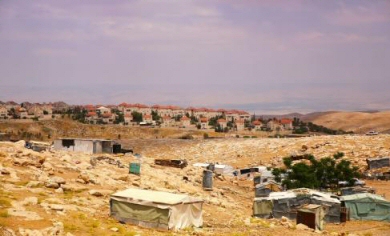Israeli forces, on Sunday, confiscated an 18-dunam plot of land near Salfit town, in the central occupied West Bank, according to local sources.
Jamal al-Ahmad, a local anti-settlement activist, said that, by declaring the plot a state land, Israel will have taken over 138 dunams of land in the area, for the benefit of expanding the industrial zone of nearby Ariel settlement.
He noted, according to WAFA, that Israel has allocated this land to Israeli investors to open their own business there, under the pretext of it being a state property.
In related news, Israeli forces ordered 10 families in the Khirbet Ibzeiq area of the occupied West Bank district of Tubas, in the Jordan Valley, to evacuate their homes to make way for Israeli military drills in the area.
Aref Daraghmah, who monitors Israeli violations in Tubas, said that Israeli forces informed the 10 families, mostly from the Turkman clan, that they needed to leave their homes on Sunday, in order for the Israeli military to carry out drills there.
Daraghmeh added that, in accordance with recent military orders, other families in the Ras al-Ahmar area, nearby, are also due to leave their homes on Sunday and Monday for similar military drills.
Palestinian residents of the Jordan Valley face regular evacuations for Israeli military exercises on or near their land. The district of Tubas is one of the occupied West Bank’s most important agricultural centers.
On an almost weekly basis, the Israeli army orders Palestinian Bedouins residing in the Jordan Valley to leave their homes, to make way for live-fire trainings.
Many Palestinians in the Jordan Valley see military exercises in firing zones, as well as repeated house demolitions as an Israeli strategy to empty the land of Palestinians and confiscate it for further settlement expansion and agricultural production.
In May of 2014, a senior Israeli army officer reported that military training in live-fire zones, in the occupied West Bank , is used “as a way of reducing the number of Palestinians living nearby, and serves as an important part of the campaign against Palestinian illegal construction.”
Colonel Einav Shalev also described the Israeli army policy of confiscating humanitarian equipment, destined for Palestinians whose homes have been destroyed, as ‘a punch in the right places’.
(photo credit: UNRWA)
Search IMEMC: “Israeli Settlement”

